2011 Arthur C Clarke Award Shortlist Announced!
The shortlist for the 2011 Arthur C. Clarke Award for Science Fiction Literature has just been announced and proves to be a surprising and diverse choice of novels of which, with my usual prescience, I have read exactly... none. There were fifty-four eligible submissions, the highest number yet, for this the 25th year of the award, coming from twenty-two different publishing houses and imprints and the esteemed panel of judges have managed to whittle them down to these six:
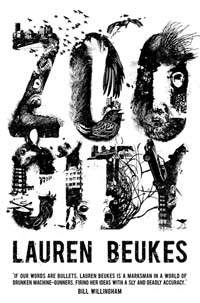 Zoo City – Lauren Beukes (Angry Robot)
Zoo City – Lauren Beukes (Angry Robot)

Zinzi has a talent for finding lost things. To save herself, she's got to find the hardest thing of all: the truth. This is Lauren Beukes second novel and for which the word 'Edgy' most frequently pops up in reviews.
It's billed as a modern fantasy that merges elements of science fiction, fantasy and noir thriller while gleefully throwing off the usual tropes that bog down each of those genres and flipping between narrative styles with intelligence tremendous wit. This has been on my radar for a while but making this shortlist with only her second novel is already a major achievement.
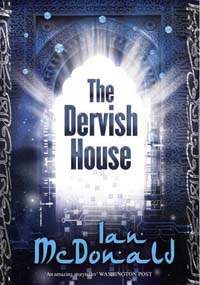 The Dervish House – Ian McDonald (Gollancz)
The Dervish House – Ian McDonald (Gollancz)

Welcome to the world of The Dervish House - the great, ancient, paradoxical city of Istanbul, divided like a human brain, in the great, ancient, equally paradoxical nation of Turkey. The year is 2027 and Turkey is about to celebrate the fifth anniversary of its accession to the European Union, a Europe that now runs from the Arran Islands to Ararat. Population pushing one hundred million, Istanbul swollen to fifteen million, Turkey is the largest, most populous, and most diverse nation in the EU, but also one of the poorest and most socially divided. It's a boom economy, the sweatshop of Europe, the bazaar of central Asia, the key to the immense gas wealth of Russia and central Asia.
The Dervish House is seven days, six characters, three interconnected story strands, one central common core—the eponymous dervish house, a character in itself—that pins all these players together in a weave of intrigue, conflict, drama, and a ticking clock of a thriller.
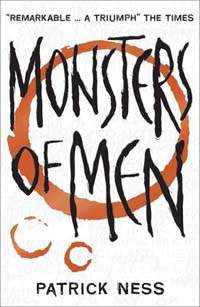 Monsters of Men – Patrick Ness (Walker Books)
Monsters of Men – Patrick Ness (Walker Books)

Monsters of Men is the finale to the Patrick Ness 'Chaos Walking' trilogy. Three armies march on New Prentisstown, each one intent on destroying the others.
Todd and Viola are caught in the middle, with no chance of escape. As the battles commence, how can they hope to stop the fighting?
How can there be peace when they're so hopelessly outnumbered? And if war makes monsters of men, what terrible choices await? But then a third voice breaks into the battle, one bent on revenge.
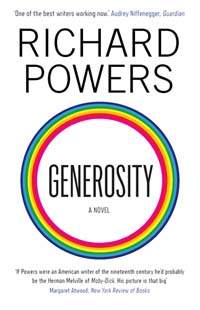 Generosity – Richard Powers (Atlantic Books)
Generosity – Richard Powers (Atlantic Books)

When Russell Stone becomes the teacher of a young Algerian woman with a disturbingly luminous presence, he is both entranced and troubled. How can this refugee from terror radiate such bliss? Is it possible to be so open and alive without coming to serious harm? Thassa's joyful personality comes to the attention of the notorious geneticist and advocate for genomic enhancement, Thomas Kurton, whose research has enabled him to announce his discovery of the genetic underpinnings of happiness.
Thassa's congenital optimism is severely tested by the growing media circus. Devoured by the public as a living prophecy, her genetic secret will transform both Russell and Kurton, as well as the world at large.
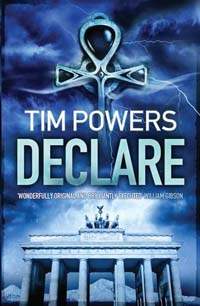 Declare – Tim Powers (Corvus)
Declare – Tim Powers (Corvus)

An ultra-secret MI6 codename, a deadly game of deception and intrigue - Dark forces from the depths of history. It is the terrible secret at the heart of the cold war. Operation: Declare London, 1963. A cryptic phone call forces ex-MI6 agent Andrew Hale to confront the nightmare that has haunted his adult life: an ultra-secret wartime operation, codenamed Declare. Operation Declare took Hale from Nazi-occupied Paris to the ruins of post-war Berlin and the trackless wastes of the Arabian desert, culminating in a night of betrayal and mind-shattering terror on the glacial slopes of Mount Ararat.
Now, with the Cold War at its height, his superiors want him to return to the mountain and face the dark secret entombed within its icy summit. Hale has no choice but to comply, for Declare is the key to a conflict far deeper, far colder, than the Cold War itself.
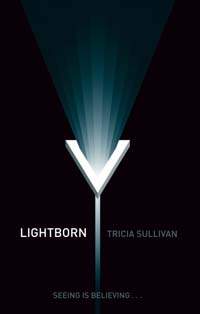 Lightborn – Tricia Sullivan (Orbit)
Lightborn – Tricia Sullivan (Orbit)

Lightborn, better known as 'shine', is a mind-altering technology that has revolutionised the modern world. It is the ultimate in education, self-improvement and entertainment - beamed directly into the brain of anyone who can meet the asking price. But in the city of Los Sombres, renegade shine has attacked the adult population, resulting in social chaos and widespread insanity in everyone past the age of puberty. The only solution has been to turn off the Field and isolate the city.
Trapped within the quarantine perimeter, fourteen-year-old Xavier just wants to find the drug that can keep his own physical maturity at bay until the army shuts down the shine. That's how he meets Roksana, mysteriously impervious to shine and devoted to helping the stricken. As the military invades street by street, Xavier and Roksana discover that there could be hope for Los Sombres - but only if Xavier will allow a lightborn cure to enter his mind. What he doesn't know is that the shine in question has a mind of its own.
Tom Hunter, administrator for the Arthur C. Clarke Award said:
“The twenty-fifth anniversary of the Arthur C. Clarke Award was always going to be a landmark year, and we couldn’t have asked for a more fascinating and exciting shortlist to get the celebrations started.
“Fifty-four eligible books is one of the highest submission years we’ve ever had, and when you look at all of the reviews, debate and online commentary that’s surrounded many of these titles you can see just how hard the judges’ deliberations were this year.
“For me this list is a great indication of just how deep, rich and complex the literature of science fiction can be. I think this list is a definite keeper, as they say, and my hope is that twenty-five years from now people will still be coming back to it as a representation of everything that’s best about the diversity and strength of our genre.”
The judging panel for the 2011 award comprises Jon Courtenay Grimwood and Martin Lewis for the British Science Fiction Association, Phil Nanson and Liz Williams for the Science Fiction Foundation and Paul Skevington for the science fiction news website SF Crowsnest.com. Paul Billinger represents the Arthur C. Clarke Award as the Chair of Judges.
The annual award was originally established by a generous grant from Sir Arthur C. Clarke with the aim of promoting science fiction in Britain, and is currently administered by the Serendip Foundation a voluntary organisation created to oversee the ongoing running and development of the Award. It is presented for the best science fiction novel of the year, and selected from a list of novels whose UK first edition was published in the previous calendar year. A prize of £2011 will be awarded to the winner along with a commemorative engraved bookend.
The winner will be announced on Wednesday 27th April at an award ceremony held during the 10th Annual SCI-FI-LONDON Film Festival
For further information please contact Award Administrator Tom Hunter on 07779 280 771 or email clarkeaward@gmail.com